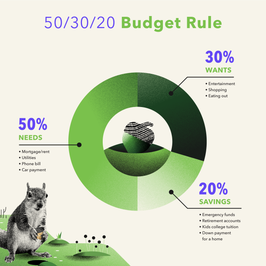How to Make a Budget Plan: 3 Ways to Start

Table of Contents
If you’re not sure where your money goes each month, you’re not alone: About half, 51%, of adults ages 23 to 38 don’t use a budget, according to a 2019 Bankrate survey.
“Sadly, we often don’t learn in school a basic life skill of how to manage money,” says Janet Stanzak, a certified financial planner and the founder of Financial Empowerment. “If we don’t take control of it, money will take control of us through high credit card debt, not saving or investing for retirement and other things that matter to us, and damaging our ability to qualify for loans.”
Creating a plan to manage money can help you become more comfortable with saving and spending. If you’re new to budgeting, here are three easy ways to start.
1. Pay yourself first
“Be sure to pay yourself first,” Stanzak explains — meaning, build savings into your budget as an essential component. “If you’re spending everything you make, not saving for your future, you’re not going to build wealth, and you’re not honoring your own hard work.”
Most employers allow for automatic direct deposit into more accounts than one, so you could split your take-home pay into different checking or savings accounts as well as regular transfers into retirement accounts such as your 401(k) or IRA.
“It’s so important to establish the habit of saving regularly,” said Pam Capalad, a certified financial planner and the founder and CEO of Brunch & Budget in New York City. “Pay yourself first. Set this money aside and automate it.”
2. Establish how much you need to pay your bills
To understand your essential living expenses, add up recurring bills including rent, utilities, and groceries. Include debt payments, such as for student loans or a mortgage, since these are things you have to pay for, as well.
In a budget framework such as the 50/30/20 rule, these essential costs should take up about 50% of your income. If they take up more, try to negotiate bills down or reassess your living situation.
“Ask yourself if the current lifestyle is the right one to allow you to be in a solid financial position in the future,” said Jorge Padilla, a certified financial planner and senior client advisor at The Lubitz Financial Group.
3. Earmark money for fun, too
It’s important to leave room in your budget to treat yourself, after saving money and paying for essentials. This discretionary spending category covers things like dining out, clothing, and entertainment.
It makes sense to “spend some money on fun and experiences that bring us happiness,” said Padilla. What that entails varies from person to person, but “studies have shown that spending money on you [as well as] on others can have a tangible impact.”
Other experts agree. “It’s important to identify and own these expenses that fill your emotional needs and make you feel like a person,” Capalad told Grow.
You might be tempted to trim back on these purchases to save money. But by knowing which discretionary expenses actually make you a happier person, Capalad says, you’re far more likely to make meaningful and lasting cuts to your expenses.
This content is provided for informational purposes only and is not intended to provide, and should not be relied on for, accounting, legal, or tax advice. Consult your accountant, tax, or legal advisor regarding such matters.
No level of diversification or asset allocation can ensure profits or guarantee against losses.
The views expressed are generalized and may not be appropriate for all investors. The information contained in this article should not be construed as, and may not be used in connection with, an offer to sell, or a solicitation of an offer to buy or hold, an interest in any security or investment product. There is no guarantee that past performance will recur or result in a positive outcome. Carefully consider your financial situation, including investment objective, time horizon, risk tolerance, and fees prior to making any investment decisions. No level of diversification or asset allocation can ensure profits or guarantee against losses.
Start saving and investing today with Acorns
Get startedThis material has been presented for informational and educational purposes only. The views expressed in the articles above are generalized and may not be appropriate for all investors. The information contained in this article should not be construed as, and may not be used in connection with, an offer to sell, or a solicitation of an offer to buy or hold, an interest in any security or investment product. There is no guarantee that past performance will recur or result in a positive outcome. Carefully consider your financial situation, including investment objective, time horizon, risk tolerance, and fees prior to making any investment decisions. No level of diversification or asset allocation can ensure profits or guarantee against losses. Article contributors are not affiliated with Acorns Advisers, LLC. and do not provide investment advice to Acorns’ clients. Acorns is not engaged in rendering tax, legal or accounting advice. Please consult a qualified professional for this type of service.









